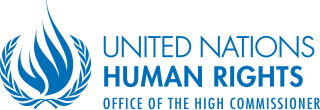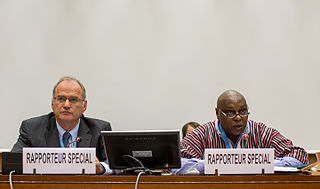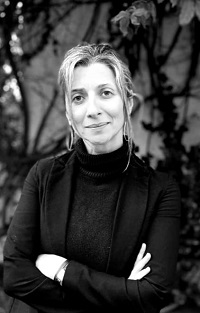
The Office of the United Nations High Commissioner for Human Rights, commonly known as the Office of the High Commissioner for Human Rights (OHCHR) or the United Nations Human Rights Office, is a department of the Secretariat of the United Nations that works to promote and protect human rights that are guaranteed under international law and stipulated in the Universal Declaration of Human Rights of 1948. The office was established by the United Nations General Assembly on 20 December 1993 in the wake of the 1993 World Conference on Human Rights.

The United Nations Human Rights Council (UNHRC) is a United Nations body whose mission is to promote and protect human rights around the world. The Council has 47 members elected for staggered three-year terms on a regional group basis. The headquarters of the Council are at the United Nations Office at Geneva in Switzerland.
A national human rights institution (NHRI) is an independent state-based institution with the responsibility to broadly protect and promote human rights in a given country. The growth of such bodies has been encouraged by the Office of the United Nations High Commissioner for Human Rights (OHCHR), which has provided advisory and support services, and facilitated access for NHRIs to the United Nations (UN) treaty bodies and other committees. There are over one hundred such institutions, about two-thirds assessed by peer review as compliant with the United Nations standards set out in the Paris Principles. Compliance with the Principles is the basis for accreditation at the UN, which, uniquely for NHRIs, is not conducted directly by a UN body but by a sub-committee of the Global Alliance of National Human Rights Institutions (GANHRI) called the Sub-Committee on Accreditation. The secretariat to the review process is provided by the National Institutions and Regional Mechanisms Section of the OHCHR.

Special rapporteur are titles given to independent human rights experts whose expertise is called upon by the United Nations to report or advise on human rights from a thematic or country-specific perspective. Depending on the specific mandate, there can also be working groups composed of an independent expert from each of the five UN regional groupings. Their work falls within the scope of "special procedure" mechanisms under the United Nations Human Rights Council, and their contributions can advance human rights through a variety of activities, including, but not limited to improving access to redress, policy reform, mainstreaming human rights, raising human rights awareness, and acting to prevent or cease rights violations.
A human rights defender or human rights activist is a person who, individually or with others, acts to promote or protect human rights. They can be journalists, environmentalists, whistleblowers, trade unionists, lawyers, teachers, housing campaigners, participants in direct action, or just individuals acting alone. They can defend rights as part of their jobs or in a voluntary capacity. As a result of their activities, human rights defenders (HRDs) are often subjected to reprisals including smears, surveillance, harassment, false charges, arbitrary detention, restrictions on the right to freedom of association, physical attack, and even murder. In 2020, at least 331 HRDs were murdered in 25 countries. The international community and some national governments have attempted to respond to this violence through various protections, but violence against HRDs continues to rise. Women human rights defenders and environmental human rights defenders face greater repression and risks than human rights defenders working on other issues.

Ahmed Shaheed is a Maldivian diplomat, politician and professor. On 24 March 2016, he was appointed for the sixth year running as the United Nations Special Rapporteur on the human rights situation in the Islamic Republic of Iran. Shaheed is also the Chairperson of the Geneva-based international human rights think-tank, Universal Rights Group, which was launched in January 2014. He now lives in England, as Visiting Professor of Human Rights Practice at the University of Essex.

Philip Geoffrey Alston is an Australian international law scholar and human rights practitioner. He is John Norton Pomeroy Professor of Law at New York University School of Law, and co-chair of the law school's Center for Human Rights and Global Justice. In human rights law, Alston has held a range of senior UN appointments for over two decades, including United Nations Special Rapporteur on extrajudicial, summary or arbitrary executions, a position he held from August 2004 to July 2010, and UN Special Rapporteur on extreme poverty and human rights from 2014-2020.
The Universal Periodic Review (UPR) is a mechanism of the United Nations (UN) Human Rights Council (HRC) that emerged from the 2005 UN reform process. Commonly referred to as the UPR, it was established by General Assembly resolution 60/251 of 3 April 2006, the UPR periodically examines the human rights performance of all 193 UN Member States. It is intended to complement, not duplicate, the work of other human rights mechanisms, including the UN human rights treaty bodies. This is the first international human rights mechanism to address all countries and all human rights. The Working Group on the UPR, which is composed of the HRC's 47 Member States and chaired by the HRC President, conducts country reviews.
The Special Rapporteur on the Right to Food is a Special Rapporteur who works for the United Nations and reports on the right to food. The mandate was established in 2000 by the former Commission on Human Rights which appointed the first Rapporteur, Dr. Jean Ziegler. In 2008 the second Rapporteur, Dr. Olivier De Schutter, was appointed by the United Nations Human Rights Council, the successor to the Commission. In 2014 the third Rapporteur, Hilal Elver was appointed. In 2020, the current Rapporteur, Michael Fakhri, was appointed.

Maina Kiai is a Kenyan lawyer and human rights activist who formerly served as the United Nations Special Rapporteur on the rights to freedom of peaceful assembly and of association from May 1, 2011, to April 30, 2017. Since 2018, he has headed Human Rights Watch's Alliances and Partnerships program.

The United Nations special rapporteur on the rights to freedom of peaceful assembly and of association works independently to inform and advise the United Nations Human Rights Council. The special rapporteur examines, monitors, advises and publicly reports on the rights to freedom of peaceful assembly and of association worldwide.

Development is a human right that belongs to everyone, individually and collectively. Everyone is “entitled to participate in, contribute to, and enjoy economic, social, cultural and political development, in which all human rights and fundamental freedoms can be fully realized,” states the groundbreaking UN Declaration on the Right to Development, proclaimed in 1986.

Agnès Callamard is a French human-rights activist who is the Secretary General of Amnesty International. She was previously the Special Rapporteur on extrajudicial, summary, or arbitrary executions appointed by the United Nations Human Rights Council, and the former Director of the Columbia University Global Freedom of Expression project.
The United Nations Special Rapporteur on the situation of human rights in the Islamic Republic of Iran is a United Nations Special Rapporteur whose mandate is to monitor and investigate human rights violations in Iran. The current Special Rapporteur is Javaid Rehman. He is the sixth special rapporteur to Iran, following the tenures of Andrés Aguilar (1984–1986), Reynaldo Galindo Pohl (1986–1995), Maurice Copithorne (1995–2002), Ahmed Shaheed (2011–2016), and Asma Jilani Jahangir (2016–2018).

Intersex people are born with sex characteristics, such as chromosomes, gonads, hormones, or genitals that, according to the UN Office of the High Commissioner for Human Rights, "do not fit the typical definitions for male or female bodies". Such variations may involve genital ambiguity, and combinations of chromosomal genotype and sexual phenotype other than XY-male and XX-female.

Martine-Anstett Award, or Martine-Anstett Human Rights Prize, is awarded every year on 29 April in Paris to the person, man or woman, strongly committed to the defense of human rights. 29 April is the anniversary of the day Martine Anstett died. Martine Anstett Human Rights Award is also to protect the rights of migrants.
Mary Lawlor is Adjunct Professor of Business and Human Rights in the School of Business of Trinity College Dublin. An Irish national, she is currently the United Nations Special Rapporteur on the situation of human rights defenders, appointed for a three-year term from May 2020. She is the founder and former Executive Director of Front Line Defenders and former Director of the Irish branch of Amnesty International.
Sheila B. Keetharuth is a Mauritius broadcaster and human rights activist who served as United Nations Special Rapporteur on the situation of human rights in Eritrea. She is the Vice-President AAIL, She was awarded Madrid Bar Association Medal of Honor for her human rights work in African.
Clément Nyaletsossi Voule is a Togolese diplomat and jurist. Voule has served as the United Nations Special Rapporteur on the Rights to Freedom of Peaceful Assembly and of Association since 2018. Prior to this, Voule served as African Advocacy Director International Service for Human Rights (ISHR).

Francesca P. Albanese is an Italian international lawyer and academic. On 1 May 2022, she was appointed United Nations Special Rapporteur on the occupied Palestinian territories for a three-year term, renewable for a further three years.












